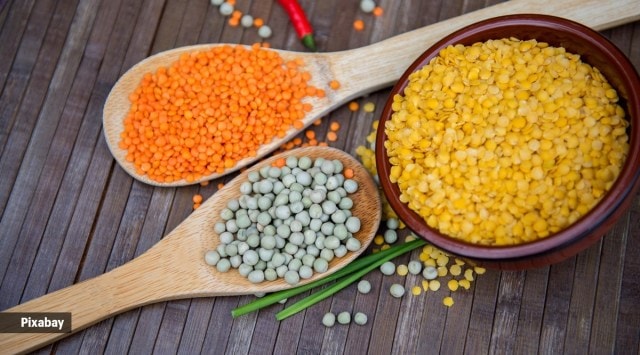📣 For more lifestyle news, click here to join our WhatsApp Channel and also follow us on Instagram
Lentils are not only nutritious, they have also been linked to long-lasting health benefits – find out here
Dals or pulses, which have been a part of our diet for a long time, are a rich source of protein
 Pulses are a good source of micronutrients like iron, zinc, magnesium, calcium, potassium, and B vitamins. (Photo: Pixabay)
Pulses are a good source of micronutrients like iron, zinc, magnesium, calcium, potassium, and B vitamins. (Photo: Pixabay)Lentils are edible seeds from the legume family, which come in a variety of sizes and colours like black, red, brown, green, or yellow. A staple in Indian cuisine, lentil or dal comprises over 25 per cent protein, making it an excellent meat alternative. As such, it is not surprising that lentils have become a buzzword in the fitness world, with many people incorporating them into their diets for maximum nutrients.
“Yes, lentils do deserve a place in the diet because they are a rich source of nutrition providing protein, fiber, and numerous minerals,” said Dr Ruchi Soni, diet and nutrition expert at ToneOp. She added that lentils are a great way to get “a polyphenol (active compounds that fight against harmful agents in the body) fix, and have been linked to long-lasting health benefits, including cardiovascular health and diabetes prevention”.
“One cup of lentils contains at least 18 grams of protein. Also, they have a good balance of protein and carbs. This means that whatever meal you incorporate lentils into, you’re getting a two-in-one source of both. Additionally, they are a good source of iron. One cup of lentils also has 6.5 milligrams of iron, which is about one-third of what you need for the entire day. Iron is super important for keeping oxygen pumping throughout your body,” she told indianexpress.com, adding that lentils are also rich in folic acid — which is especially important when you’re pregnant; and also fibre — one cup of lentils has at least 10 grams of it, which is actually almost twice as much as a cup of raw kale.
Dietitian Mac Singh also highlighted the benefits of having dal in a Facebook post. These include:
Rich source of protein: Dals are called the poor man’s meat for a reason. They provide protein while being easy on the pocket. Dals contain 20-25% protein which is double the amount present in wheat and triple the amount in rice.
High in complex carbohydrates and fibers: Dals are rich in complex carbs that do not get used up quickly leaving you exhausted. Instead, they slowly release energy into the body. Dals, being rich in fiber, help improve satiety and keep one full for longer.
Rich in micronutrients: Pulses are a great source of micronutrients like iron, zinc, magnesium, calcium, potassium, and especially, B vitamins.
Good source of antioxidants: Dals are anticarcinogens due to the presence of flavonoids and polyphenols.
 What do you consume to meet your body’s protein requirement? (Photo: Getty Images/Thinkstock)
What do you consume to meet your body’s protein requirement? (Photo: Getty Images/Thinkstock)
Good for diabetics: Pulses or dals have a low glycemic index. Along with this, the fiber present in them slows down the absorption of sugar in the bloodstream.
Good for heart: Since dals are rich in both soluble and insoluble fiber, the soluble fiber binds to the cholesterol present in the gut and hence, removes it from the body. Many dals such as masoor dal are high in potassium which regulates blood pressure.
Storehouse of B vitamins: The vitamin B group helps food get converted into energy. For example, vit B7 is especially great for hair and skin health, vit B12 helps in the formation of red blood cells and DNA. In fact, one bowl of moong dal contains 100% of your daily folate requirement.
However, it must be noted that consuming too much dal has its own side effects. “Many people experience flatulence or bloating after consuming dal due to the high amount of complex carbs in them,” Mac wrote in his post.
How to consume dal?
Raw dal contains tannins, phenols, and phytic acid, which are anti-nutrients that prevent minerals from being absorbed by the body. Mac advises to always soak dals for 1-2 hours before cooking. Also, soaking makes dals digestible.
Agreed Dr Soni, and said: “Although all lentils are nutritious,but black lentils) are the most nutritious variety of lentils, boasting the highest amount of protein, plus high level of calcium, potassium and iron. The best way to have them is to soak them overnight and the pressure cook for 30 minutes with the pinch of salt.”
📣 For more lifestyle news, follow us on Instagram | Twitter | Facebook and don’t miss out on the latest updates!
📣 For more lifestyle news, click here to join our WhatsApp Channel and also follow us on Instagram






- 01
- 02
- 03
- 04
- 05





















